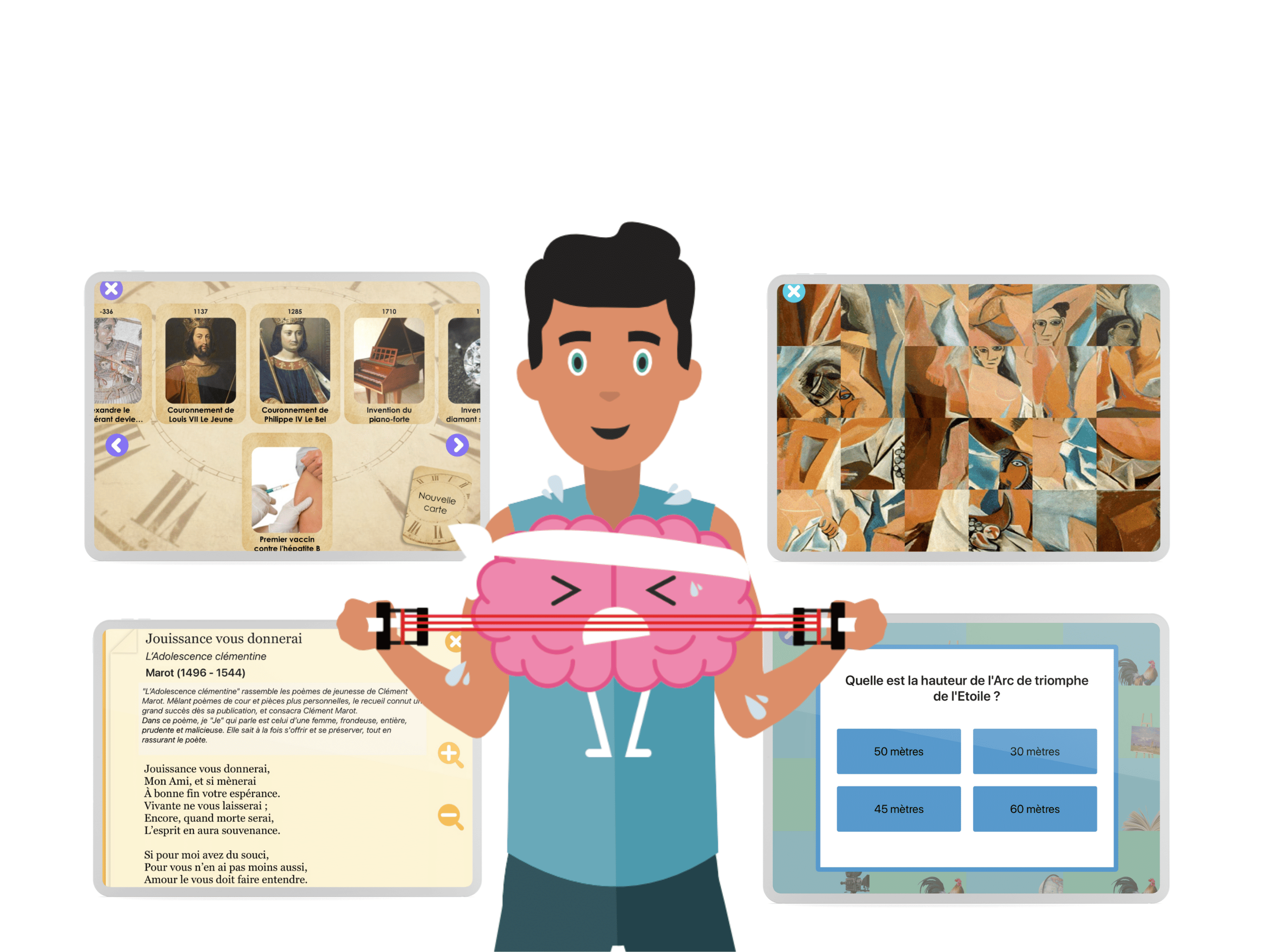The game world is incredibly large and diverse, offering players a plethora of different experiences and genres. But did you know that some games can help stimulate your brain?
Games to boost your brain
Chess
One of the oldest and most popular board games in the world, chess is a timeless classic that has been around for centuries. Chess is a great game to improve your problem solving and overall cognitive skills. Chess is a strategy game that improves memory, planning and decision making. Playing chess can also stimulate creativity and improve problem solving.
Super Mario and video games
This classic game has stood the test of time and continues to entertain children of all ages. Super Mario is a good video game for children because it teaches them hand-eye coordination and basic problem-solving skills. Other games are also available to boost your child’s brain, including:
- Minecraft;
- The Sims ;
- Super Smash Bros;
- Lego Star Wars, etc.
These are just a few of the top ten video games for kids that can help stimulate your child’s brain.
Blackjack
Blackjack is one of the most popular casino games and is a great way to sharpen your mental skills. When you play, you must carefully weigh the odds and make decisions based on the cards in your hand. This requires a great deal of concentration and thought. You can find it online at Unique Casino.
Sudoku
Sudoku is a number-based puzzle game that requires players to solve a nine-by-nine grid using logical reasoning and deduction. This is a great game to stimulate your critical thinking and improve your problem solving skills.
Poker
Poker is another popular casino game that requires strategic thinking. In this game, you must make decisions based on the cards you are dealt and the cards on the table. This is an ideal game to exercise your strategic thinking and analytical skills.
Word games
Word games are games that involve playing with words, phrases and ideas. These games can include crossword puzzles, Scrabble games, charades, guessing games and many others. Examples of popular word games include Words with Friends, Bananagrams, Boggle and Pictionary. Word games can help improve the ability to understand and use language effectively, improve thinking skills and creativity. They can also help improve problem solving, quick thinking and communication skills. Word games are often used in educational programs to improve students’ language skills and in professional settings to improve communication and collaboration skills. In addition, word games can also be beneficial for people with learning disabilities, such as dyslexia. All in all, word games are a great way to stimulate your brain and improve your language, problem-solving and communication skills.
Logic games
Logic games are games that involve reasoning, solving problems and finding solutions using logical principles. These games can include puzzles, number games, word games and strategy games. Examples of popular logic games include Rubik’s Cube, Set card game, Rush Hour board game and Chess. Logic games can help improve problem solving, critical thinking and reasoning skills. They can also help improve the ability to analyze and understand complex situations, make informed decisions and develop problem-solving skills. Logic games are often used in educational programs to improve students’ problem-solving skills and in professional settings to improve analytical thinking and problem-solving skills. In addition, logic games can also be beneficial for people with cognitive disorders such as Alzheimer’s disease. All in all, logic games are a great way to stimulate your brain and improve your reasoning, problem-solving and critical thinking skills.

Memory Games
Memory games are a great way to stimulate your brain and improve your short-term memory. These games often involve remembering a sequence of colors, shapes or sounds and reproducing them in the correct order. Examples of popular memory games include the Memory Game and Simon. Playing these games regularly can help improve your concentration, short-term memory and problem-solving skills. Memory games can also benefit people with memory disorders, such as Alzheimer’s disease, by helping to slow cognitive decline and improve quality of life. Whether you are young or old, memory games are a great way to stimulate your brain and stay mentally active.

Strategy Games
Strategy games are games that require careful thought and planning to win. These games can be played against human opponents or computers and can range in complexity from simple strategy games to massively multiplayer war games. Examples of popular strategy games include Risk, Civilization, Starcraft, Age of Empires and Dota 2. Strategy games stimulate critical thinking, decision making and strategic planning, and problem solving. They can also improve the ability to understand the consequences of one’s actions and to anticipate the opponent’s movements. Strategy games are also used in military training and business schools to develop leadership and decision-making skills. All in all, strategy games are a great way to stimulate your brain and improve your mental skills.
Thinking games
Thinking games are games that focus on problem solving, logic and creative thinking. These games can include puzzles, riddles, brainteasers, word games and math games. Examples of popular puzzle games include Tetris, Portal, The Witness and Monument Valley. Thinking games stimulate creativity, memory, concentration and decision making. They also help improve problem-solving and critical thinking skills. Puzzle games can be beneficial for people of all ages, especially for those with cognitive disorders such as Alzheimer’s disease or traumatic brain injury. In addition, puzzle games are often seen as a way to reduce stress and improve mood. All in all, puzzle games are a great way to stimulate your brain and improve your mental skills.
Speed Reading Games
Speed reading games are games that aim to improve reading speed and comprehension. These games often involve reading passages or sentences quickly and answering comprehension questions. Examples of popular speed reading games include Spritz, Spreeder and AceReader. Speed reading games can help improve the ability to process information quickly and understand ideas quickly. They can also help improve the ability to stay focused on a task and filter out distractions. Speed reading games are often used in educational programs to improve students’ reading skills and in professional settings to improve reading efficiency and productivity. In addition, speed reading games can also be beneficial for people with learning disabilities, such as dyslexia. All in all, speed reading games are a great way to stimulate your brain and improve your reading and comprehension skills.
Mathematics Games
Math games are games that stimulate mathematical thinking and problem solving. These games can include math puzzles, logic games, number games, geometry games and more. Examples of popular math games include Math Blaster, Number Munchers, and KenKen. Math games can help improve the ability to understand mathematical concepts, solve mathematical problems, and use math in everyday life. They can also help improve the ability to reason logically, make decisions and solve complex problems. Math games are often used in educational programs to improve students’ mathematical skills and in professional settings to improve problem-solving and analytical thinking skills. In addition, math games can also be beneficial for people with learning disabilities, such as dyscalculia. All in all, math games are a great way to stimulate your brain and improve your math and problem-solving skills.
Music Games
Music games are games that involve creating, listening to or playing music. These games can include rhythm games, guitar simulators, piano games and karaoke games. Examples of popular music games include Rock Band, Guitar Hero, Beat Saber and Just Dance. Music games can help improve hand-eye coordination, memory and the ability to follow rhythm and melodies. They can also help improve the ability to listen to and understand music. Music games are often used in educational programs to teach students musical concepts and in professional settings to improve communication and teamwork skills. In addition, music games can also be beneficial for people with cognitive disorders such as Alzheimer’s disease. All in all, music games are a great way to stimulate your brain and improve your musical and cognitive skills.
So playing games can be a great way to stimulate your brain. Whether you prefer online games, word games, strategy games or puzzle games, there is sure to be a game that suits your preferences and can help improve your cognitive functioning. So challenge your brain and play these games to improve your mental skills!
Other articles that might interest you:
How Parents Can Contribute to Teacher Training
As we delve into the realm of education, it becomes increasingly clear that teacher training is not merely a...
Differentiated Instruction Approaches: Training and Practical Application
Differentiated instruction is a pedagogical approach that recognizes the diverse needs of students in a classroom. It...
Key Skills Teachers Need to Support Students with Special Needs
As we embark on our journey to support children with special needs, it is essential for us to cultivate a deep...










